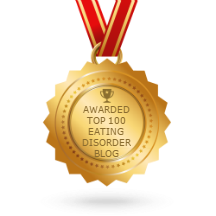- Home
- About
-
Services
- Therapy
-
Eating Disorder Trainings
>
- Clinical Approaches To Treating Body Image Issues
- Clinical Approaches To Treating Bulimia & Binge Eating Disorder
- Finding Freedom From Binge Eating
- Finding Freedom From Anorexia
- Supporting A Loved One With An Eating Disorder
- Eating Disorder Recovery Road Map
- Healing From Body Hate And Practicing Self-Compassion
- Common Questions
- Blog
- Press
- Contact
|
I’m in the check-out line at Nordstrom Rack, when a 13-year-old boy points at a snack by the register and says, “look mom that has X many calories, in that little package! It's way too much.” As an eating disorder therapist, it took everything in me not to turn around and say, “calories are units of energy that help you live your life, not something that you need to fear.” However, by the time I had contemplated this in my head, they had already moved onto another topic of conversation. Diet-talk, fat-phobia, and comments about weight/weight-loss, unfortunately is rampant in our culture. However, like fish who have gotten used to swimming in polluted water-these kinds of topics and comments are seen as culturally normative. As a society, we’ve been conditioned to believe that fat=bad, that thin=good, and that calories (as well as certain foods) are the enemy. We’ve been sold these lies because they fuel multi-billion dollar industries, including the diet industry and the medical “weight loss” industry. If we believed that we were enough, just as we are-then we wouldn’t flock to purchase the latest diet products, expensive juice cleanses, and medical procedures. Recovering from an Eating Disorder in A Disordered Culture Eating disorders are life-threatening mental illnesses, whose symptoms often manifest in a preoccupation with food and weight. Recovering from an eating disorder in the midst of this disordered culture that we live in, can be tough. However, it is 100% possible. The following are a few quick tips for how to cope when you are feeling triggered: 1. Notice the thoughts and feelings that are coming up for you, without judgement. Practice, simply noticing any eating disorder thoughts, as well as any feelings that come up for you in response to the trigger. Instead of judging the thought, try to be curious about it. 2. Respond from your “healthy self.” Think about what you’d say to a friend, a small child, or a loved one who said exactly what you just told yourself. This concept comes from Carolyn Costin, a prominent eating disorder therapist and founder of Monte Nido. I love having clients practice writing out dialogues between their “eating disorder self,” and their “healthy self.” Often, I will have them role-play this with me in session, as well. An Example: Eating disorder self: You can’t eat that pizza, it’s so bad for you. You don't deserve to eat it. Healthy self: I always deserve to nourish myself with food that I enjoy. Food isn’t good or bad. All foods can fit in a healthy diet. 3. Recognize that any comments are really a reflection of the other person. People who are making lots of comments about food and weight, are simply demonstrating where their own focus lies. Try to recognize that any food or weight related comments are really just a reflection of the other person, and have little to do with you. If you can, try to practice imagining yourself sending some compassion to the other person, because they are still steeped in diet-culture and fat-phobia. It’s such a waste of precious brain space, and it truly is sad to see someone who is so immersed in this. There are so many better uses of time, energy, and money. 4. Set some healthy boundaries. I was talking to a wise woman the other day (shout out to Nicole Mcdermid) about how setting boundaries can actually be an act of compassion-both for you and the other person. If we don’t set healthy boundaries, often we can grow resentful and this can negatively impact the relationship. If someone is going on about their latest diet or weight loss it’s perfectly appropriate to change the subject, make an excuse to leave the room, or say “so what else is going on in your life? I know there’s a lot more to you, than your new diet!” If you feel comfortable, you could also share that you are in recovery from an eating disorder and find this kind of talk to be triggering. You deserve to set boundaries for your own self-care. Also, in modeling that these topics are unhelpful-you might be planting a seed for someone else who is stuck in a disordered mentality. Practice Self-Compassion Eating disorder recovery is hard work. Additionally, recovering from an eating disorder when everyone is running around talking about their latest juice cleanse (shout out to my liver and kidneys for rendering any kind of “cleanse” totally unnecessary), or weight-loss attempt, can be tough. It’s so important to be compassionate with yourself, if you are finding that you are triggered by comments that others are making. If you can, work to surround yourself with positive people both in person and online. While it's important to learn how to cope with triggers in the environment, you can also do your best to surround yourself with a "pro recovery bubble." Recovery is hard work, and it will be so worth it. Jennifer Rollin, MSW, LCSW-C: is an eating disorder therapist in private practice in Rockville, Maryland. Jennifer specializes in helping teens and adults struggling with anorexia, binge eating disorder, and bulimia, and body image issues. Jennifer provides eating disorder therapy in Rockville, MD, easily accessible to individuals in Potomac, North Potomac, Bethesda, Olney, Germantown, and Washington D.C. Connect with Jennifer through her website: www.jenniferrollin.com Check out Jennifer's on-demand eating disorder trainings here!
1 Comment
10/26/2018 01:49:47 pm
I have a friend who's been struggling with an eating disorder for a while and I'm trying to figure out the best way to help her through it. It seems like weight and food are things that can be difficult to discuss which I never would have figured out without this. I'll keep that in mind so that she doesn't feel any pressure coming from me.
Reply
Leave a Reply. |
About MeI'm an eating disorder therapist in private practice in Rockville, MD. Archives
June 2024
|


 RSS Feed
RSS Feed
